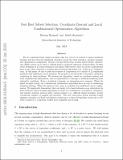Fast Best Subset Selection: Coordinate Descent and Local Combinatorial Optimization Algorithms
Author(s)
Hazimeh, Hussein; Mazumder, Rahul
DownloadAccepted version (1.419Mb)
Open Access Policy
Open Access Policy
Creative Commons Attribution-Noncommercial-Share Alike
Terms of use
Metadata
Show full item recordAbstract
The L₀-regularized least squares problem (a.k.a. best subsets) is central to sparse statistical learning and has attracted significant attention across the wider statistics, machine learning, and optimization communities. Recent work has shown that modern mixed integer optimization (MIO) solvers can be used to address small to moderate instances of this problem. In spite of the usefulness of L₀-based estimators and generic MIO solvers, there is a steep computational price to pay when compared with popular sparse learning algorithms (e.g., based on L₀ regularization). In this paper, we aim to push the frontiers of computation for a family of L₀-regularized problems with additional convex penalties. We propose a new hierarchy of necessary optimality conditions for these problems. We develop fast algorithms, based on coordinate descent and local combinatorial optimization, that are guaranteed to converge to solutions satisfying these optimality conditions. From a statistical viewpoint, an interesting story emerges. When the signal strength is high, our combinatorial optimization algorithms have an edge in challenging statistical settings. When the signal is lower, pure L₀ benefits from additional convex regularization. We empirically demonstrate that our family of L₀-based estimators can outperform the state-of-the-art sparse learning algorithms in terms of a combination of prediction, estimation, and variable selection metrics under various regimes (e.g., different signal strengths, feature correlations, number of samples and features). Our new open-source sparse learning toolkit L0Learn (available on CRAN and GitHub) reaches up to a threefold speedup (with p up to 10 ) when compared with competing toolkits such as glmnet and ncvreg. 0 0 1 0 0 0 6
Date issued
2020-08Department
Massachusetts Institute of Technology. Operations Research Center; Sloan School of ManagementJournal
Operations Research
Publisher
Institute for Operations Research and the Management Sciences (INFORMS)
Citation
Hazimeh, Hussein and Rahul Mazumder. “Fast Best Subset Selection: Coordinate Descent and Local Combinatorial Optimization Algorithms.” Operations Research, 68, 5 (August 2020): iii-vi, 1285-1624, C2-C3 © 2020 The Author(s)
Version: Author's final manuscript
ISSN
0030-364X
1526-5463